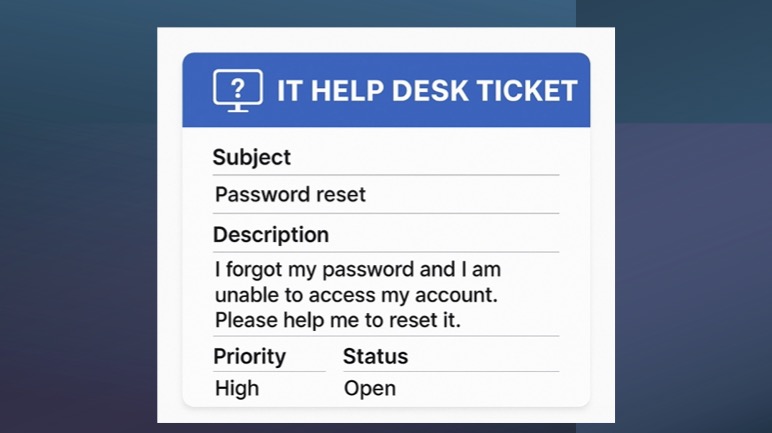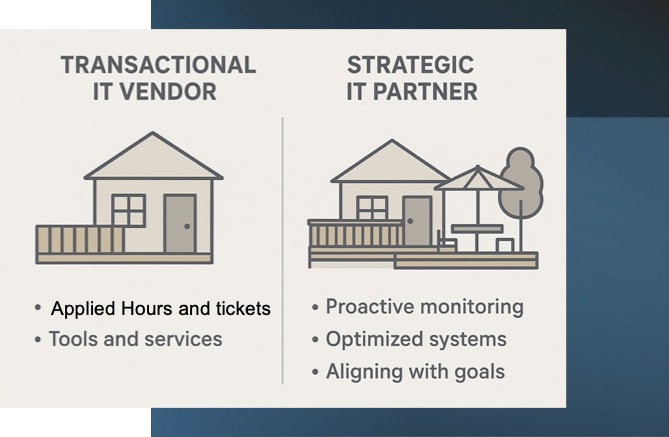In a previous article, we explored the benefits of an All-Inclusive Seat Price (AISP) compared to simply purchasing a block of hours for IT support. One of the central takeaways was that reviewing a monthly statement of applied hours against closed tickets is not a sufficient way to measure your IT vendor’s performance.
When technology is truly strategic to an organization, success goes far beyond closing tickets quickly or staying within a set number of billable hours. The reality is simple: if your employees can’t rely on IT systems to perform their jobs effectively, what difference does it make if your IT vendor used 23½ of their 24 hours last month?
However, extracting the value of an AISP agreement is not a straightforward accounting exercise. These agreements are designed to be holistic. They provide access to technical expertise; embed tools for the environment and automate services that run quietly in the background. Proven processes that update systems, monitor performance, manage backups, and send alerts when issues arise. In other words, an AISP is built not only to fix problems but also to prevent them.
To better understand why this distinction matters, let’s look at a simple analogy.
Building a Deck: Transactional vs. Strategic
Imagine you’ve decided to build a deck onto your home. You begin by taking measurements, browsing photos of other projects, and researching the cost of materials—decking, railings, fasteners, lighting, and so on. You find a handyman who has built decks before, and he estimates the job will take 50 to 60 hours.
You order the materials, the handyman gets to work, and after a few weeks, you have a deck.
From a purely transactional standpoint, this project seems straightforward: you have receipts for the materials, an invoice for the hours of labor, and a finished deck. But here’s the question: did you really achieve the complete vision for your home?
Does the new deck exceed your family’s expectations? Does it provide the perfect space for entertaining friends on weekends, or a peaceful place to relax after work? Or does it simply exist—built to a minimum standard, without much thought about design, durability, or long-term enjoyment?
This is the difference between a transactional project and a strategic one.
IT Support: More Than Just a Block of Hours
In the same way, IT support can be highly transactional. Value focused vendors will offer to sell blocks of hours for monthly support. They’ll recommend a list of tools and services to purchase for management of the environment. At the end of the month, you’ll have statements of work done with invoices that you can easily tally up.
But here’s the catch: do these invoices reflect the real value the vendor is bringing to your business? Does the approach give you confidence that the technology used strategically optimizes operations and supports continued growth? Or are you just “checking a box” by paying for the minimum needed to keep systems running?
Business leaders looking to distinguish themselves in the marketplace recognize the answer lies in how IT is positioned. If technology is simply a cost to be managed, a block of hours may feel adequate. But if technology is strategic—if it directly impacts productivity, security, and your ability to serve customers—then a deeper partnership is required.
The Right Questions to Ask
If your IT provider is only selling you their time with tools, would you feel confident asking questions like these?
- How often are we reacting to incidents versus preventing them?
- Who manages our daily backups—and how do we know they’re working?
- What role does the IT vendor play in our business continuity plan?
- If our primary line-of-business application went down, what happens next?
- How much would a cybersecurity breach cost us, and are we doing enough to mitigate the risk?
- What challenges are we facing as a business right now, and how can technology help solve them?
These questions don’t just focus on transactions. They reflect a bigger picture of how IT enables your organization to function, grow, and remain competitive. An hourly vendor may struggle to provide meaningful answers. A strategic IT partner, on the other hand, makes these conversations part of the ongoing relationship.
Measuring IT Like You Measure Employees
If technology is strategic, then measuring IT performance should look more like evaluating your most critical employees. Think about it: you don’t judge your top performers solely by whether they show up for 40 hours of work each week. You measure them by objectives, results, collaboration, and their contributions to moving the company forward.
The same applies to your IT partner. A strategic vendor shouldn’t just “show up” to close tickets. They should be accountable for outcomes—minimize disruptions, reduce risk, and help your business make smart technology decisions.
Morefield is that Strategic Partner
At Morefield, our Managed Services Program (MSP) is built around this philosophy. We don’t see ourselves as just another vendor tracking hours. We see ourselves as a strategic partner committed to making technology predictable, reliable, and valuable for your employees.
Here’s how we deliver on that commitment:
- Reduce disruption. We proactively monitor systems, manage backups, and apply updates so your employees spend less time waiting on fixes and more time being productive.
- Provide actionable insight. Each month, we collect and analyze data from your environment and present it in recurring meetings. This gives you a clear picture of system performance, risks, and opportunities.
- Collaborate on strategy. We work side by side with your leadership team to align technology with business goals, whether that means improving operations, enhancing security, or planning for growth.
- Ensure reliability. Our goal is for your employees to trust the tools they use every day, so technology becomes an enabler rather than a distraction.
This approach transforms IT from a line-item expense into a lever for business success.
Moving Beyond the Easy Numbers
The value of IT isn’t found in a monthly invoice or a tally of closed tickets. Your IT vendor should be measured by the confidence and competitive advantage it brings to your employees and organization.
When you treat technology as strategic, you stop asking, “How many hours did we use last month?” and start asking, “How is IT helping us move forward?”
That shift in perspective is where the real value of a managed services partnership lies.
Time to Consider a New Approach? Realize the Value of a Strategic IT Vendor
Building a deck with a handyman and a stack of materials might technically work, but it rarely delivers the space you’ve been dreaming of. In the same way, relying on a block of IT hours may keep your systems functional, but it doesn’t deliver the reliability, security, and strategic advantage your business truly needs.
The choice is clear: if you want technology that not only supports but actively drives your organization forward, you need to evolve past the transactional vendor. You need a business partner who understands your goals, anticipates challenges, and works alongside you to optimize your systems.
At Morefield, that’s the promise of our MSP program. We go beyond hours and tickets to provide proactive, strategic, and outcome-driven IT support. The result is a partnership that lessens disruption, ensures reliability, and equips your business to make smart technology decisions every day.


